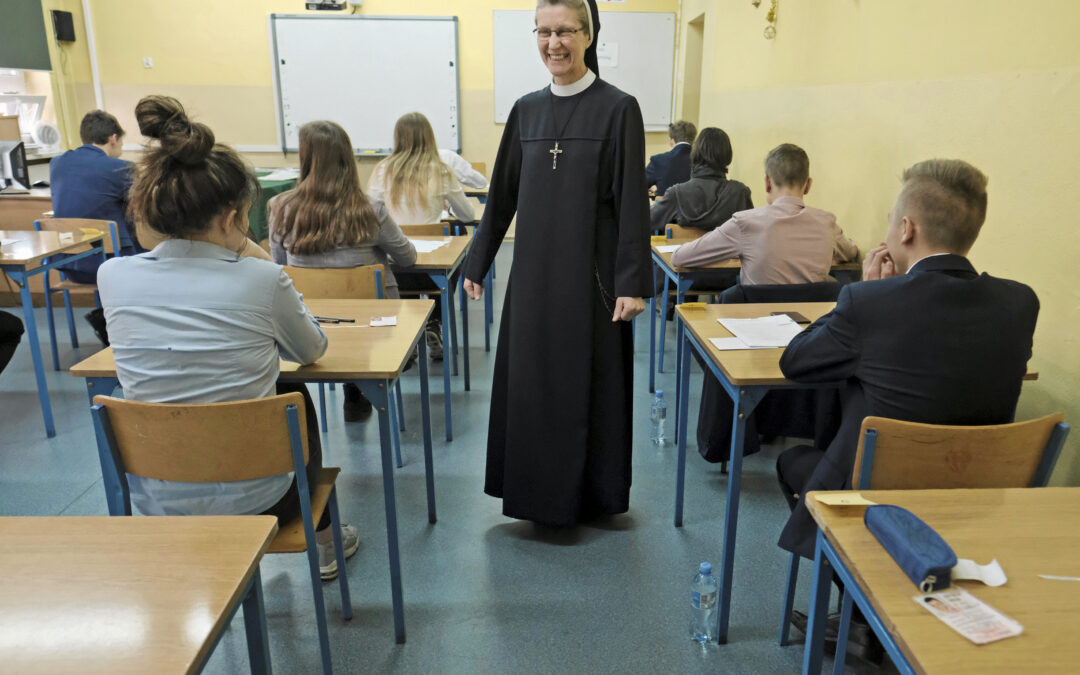A small number of municipalities around the city of Kraków spent 12 million zloty (€2.6 million) of public money last year on Catholic catechism classes in schools. The education minister has previously revealed that, nationally, Poland spends around 1.5 billion zloty (€327 million) on such classes.
The latest data were revealed by activists who are part of a growing trend for groups around Poland to ask local authorities for details of how much they spend on “religion” classes, which are hosted in and funded by public schools but with curriculums and teachers (often priests or nuns) chosen by the church.
The findings come as growing numbers of parents are withdrawing their children from the optional classes, amid polls showing declining trust towards the church. Surveys have also shown that a majority of Poles would prefer the classes to be held on church property and not to be funded by the state.
“At schools there are shortages of paper and soap, there are no modern educational materials, but instead we finance ‘religion classes’, which should be conducted on church premises,” said Wiktoria Kawiorska, an activist from the Young Left (Młoda Lewica), which announced the new data.
They found, for example, that the district of Olkusz – an area of 50,000 residents to the northwest of Kraków – spent 1.8 million zloty on salaries for teachers of religion classes last year. That could have covered the cost of 180,000 free meals for pupils, note the activists.
The Dobra municipality south of Kraków, which has 10,000 residents, allocated 890,000 zloty to religion teachers. Data for Kraków itself are not available, but the city in 2019 revealed that it employs nearly 400 catechists. Gazeta Wyborcza, a leading liberal daily, calculates that they would be paid around 19.5 million zloty a year.
A recent similar enquiry by activists in Poznań foiund that the city spends 21 million zloty a year on religion teachers. In Gdańsk, the figure is 15 million, reports Gazeta Wyborcza.
“As a rule, costs for small, rural municipalities are proportionally the highest, simply because there are fewer pupils in countryside schools,” Piotr Pawłowski, director of the Omnium Foundation, which collected similar data for Pomerania province, told Onet.
In tiny Krynica Morska, a municipality with only 1,300 residents and no more than 85 school pupils, Catholic catechism teachers’ salaries amounted to 75,000 zloty annually.
Meanwhile, Agata Diduszko-Zyglewska, an opposition councillor in Warsaw, enquired about the cost of teaching the class in the capital. But, like Kraków, the city could not make the data available. “[Warsaw] doesn’t know how much it’s spending on salaries of teachers of non-obligatory Catholic catechism [classes],” Diduszko-Zyglewska told Gazeta Wyborcza.
She stressed that many Warsaw schools lack funds for renovation or classes for children with learning difficulties. “Both the city and parents should be aware of the annual cost of Catholic catechism classes in order to rationally plan the school budgets,” Diduszko-Zyglewska wrote on Facebook.
At school, children spend the most hours learning:
1. Polish (950)
2. Maths (760)
3. PE (760)
4. Foreign languages (722)
5. Religion (608) (optional)
6. History (342)
7. IT, geography, biology (190)
8. Chemistry, physics, music, art (152)Via @konkret24: https://t.co/00bykGGuS9 pic.twitter.com/WqmthZtBlE
— Notes from Poland 🇵🇱 (@notesfrompoland) November 28, 2019
“We got used to the fact that there are Catholic catechism classes in schools, and that schools give their space and time to teach those classes. We forget, however, that it costs a small fortune a year,” said Maciej Gdula, a sociologist and MP for The Left (Lewica), talking to Gazeta Wyborcza.
Gdula estimates that the total annual spending on salaries for teachers of Catholic catechism classes is 1.5 billion zloty. In 2018, the education ministry revealed that almost 22,000 catechists are employed by public schools and preschools. Their salaries would have totalled almost 1.5 billion, calculated Rzeczpospolita, a centre-right daily, at the time.
Those costs, however, do not take into account the use of classrooms and equipment, nor of other expenses related to organising, scheduling and running the classes.
There have been growing voices in Poland questioning whether such classes should continue to be hosted in and funded by public schools. The developments come amid growing challenges to the position of the Catholic church in Poland.
Official data have recently shown that an increasing number of children are withdrawing from religion classes. That has happened amid mass protests against an unpopular near-total ban on abortion, with many seeing the church as being behind it. The Catholic hierarchy has also been accused of covering up child sex abuse by clergy.
According to a poll conducted in December by Ipsos for OKO.press, 68% of respondents believe that catechism classes should take place in church facilities, while only 27% think they should continue to take place in schools.
In 2019, a Kantar poll found that 66% of Poles want religion classes to be funded by the church itself. Another survey the same year, by SW Research for Rzeczpospolita, found that 55.5% wanted to end state funding for the classes.
Main image credit: Piotr Skornicki / Agencja Gazeta

Agnieszka Wądołowska is deputy editor-in-chief of Notes from Poland. She is a member of the European Press Prize’s preparatory committee. She was 2022 Fellow at the Entrepreneurial Journalism Creators Program at City University of New York. In 2024, she graduated from the Advanced Leadership Programme for Top Talents at the Center for Leadership. She has previously contributed to Gazeta Wyborcza, Wysokie Obcasy and Duży Format.




















